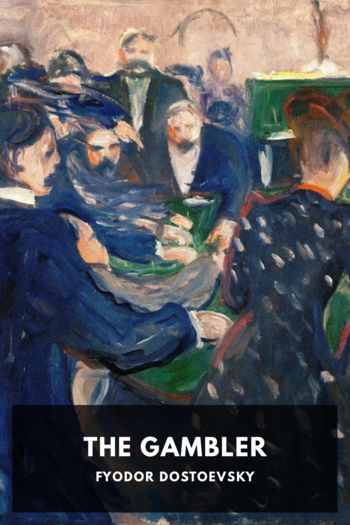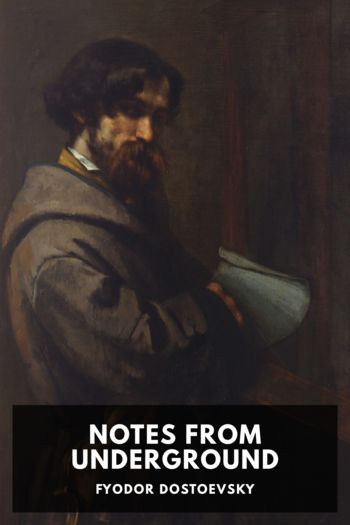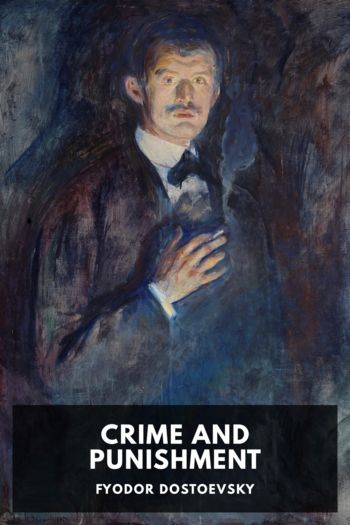Poor Folk by Fyodor Dostoevsky (best fiction books to read .TXT) 📕

- Author: Fyodor Dostoevsky
Book online «Poor Folk by Fyodor Dostoevsky (best fiction books to read .TXT) 📕». Author Fyodor Dostoevsky
By the time I had returned to Gorokhovaia Street darkness had fallen and the lamps had been lit. However, I did not linger long in that particular spot, for Gorokhovaia Street is too noisy a place. But what sumptuous shops and stores it contains! Everything sparkles and glitters, and the windows are full of nothing but bright colours and materials and hats of different shapes. One might think that they were decked merely for display; but no—people buy these things, and give them to their wives! Yes, it is a sumptuous place. Hordes of German hucksters are there, as well as quite respectable traders. And the quantities of carriages which pass along the street! One marvels that the pavement can support so many splendid vehicles, with windows like crystal, linings made of silk and velvet, and lackeys dressed in epaulets and wearing swords! Into some of them I glanced, and saw that they contained ladies of various ages. Perhaps they were princesses and countesses! Probably at that hour such folk would be hastening to balls and other gatherings. In fact, it was interesting to be able to look so closely at a princess or a great lady. They were all very fine. At all events, I had never before seen such persons as I beheld in those carriages. …
Then I thought of you. Ah, my own, my darling, it is often that I think of you and feel my heart sink. How is it that you are so unfortunate, Barbara? How is it that you are so much worse off than other people? In my eyes you are kindhearted, beautiful, and clever—why, then, has such an evil fate fallen to your lot? How comes it that you are left desolate—you, so good a human being! While to others happiness comes without an invitation at all? Yes, I know—I know it well—that I ought not to say it, for to do so savours of free-thought; but why should that raven, Fate, croak out upon the fortunes of one person while she is yet in her mother’s womb, while another person it permits to go forth in happiness from the home which has reared her? To even an idiot of an Ivanushka such happiness is sometimes granted. “You, you fool Ivanushka,” says Fate, “shall succeed to your grandfather’s moneybags, and eat, drink, and be merry; whereas you (such and such another one) shall do no more than lick the dish, since that is all that you are good for.” Yes, I know that it is wrong to hold such opinions, but involuntarily the sin of so doing grows upon one’s soul. Nevertheless, it is you, my darling, who ought to be riding in one of those carriages. Generals would have come seeking your favour, and, instead of being clad in a humble cotton dress, you would have been walking in silken and golden attire. Then you would not have been thin and wan as now, but fresh and plump and rosy-cheeked as a figure on a sugar-cake. Then should I too have been happy—happy if only I could look at your lighted windows from the street, and watch your shadow—happy if only I could think that you were well and happy, my sweet little bird! Yet how are things in reality? Not only have evil folk brought you to ruin, but there comes also an old rascal of a libertine to insult you! Just because he struts about in a frockcoat, and can ogle you through a gold-mounted lorgnette, the brute thinks that everything will fall into his hands—that you are bound to listen to his insulting condescension! Out upon him! But why is this? It is because you are an orphan, it is because you are unprotected, it is because you have no powerful friend to afford you the decent support which is your due. What do such facts matter to a man or to men to whom the insulting of an orphan is an offence allowed? Such fellows are not men at all, but mere vermin, no matter what they think themselves to be. Of that I am certain. Why, an organ-grinder whom I met in Gorokhovaia Street would inspire more respect than they do, for at least he walks about all day, and suffers hunger—at least he looks for a stray, superfluous groat to earn him subsistence, and is, therefore, a true gentleman, in that he supports himself. To beg alms he would be ashamed; and, moreover, he works for the benefit of mankind just as does a factory machine. “So far as in me lies,” says he, “I will give you pleasure.” True, he is a pauper, and nothing but a pauper; but, at least he is an honourable pauper. Though tired and hungry, he still goes on working—working in his own peculiar fashion, yet still doing honest labour. Yes, many a decent fellow whose labour may be disproportionate to its utility pulls the forelock to no one, and begs his bread of no one. I myself resemble that organ-grinder. That is to say, though not exactly he, I resemble him in this respect, that I work according to my capabilities, and so far as in me lies. More could be asked of no one; nor ought I to be adjudged to do more.
Apropos of the organ-grinder, I may tell you, dearest, that today I experienced a double misfortune. As I was looking at the grinder, certain thoughts entered my head and I stood wrapped in a reverie. Some cabmen also had halted at the spot, as well as a young girl, with a yet smaller girl who was dressed in rags and tatters. These people had halted there to listen to the organ-grinder, who was playing in front of someone’s windows. Next, I caught sight of a little urchin of about ten—a boy who would have been good-looking but for the fact that his face was pinched





Comments (0)